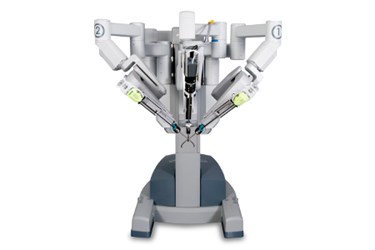Intuitive Surgical Developing "Variety Of Technologies" To Enhance Robotic Surgery Platform
By Jof Enriquez,
Follow me on Twitter @jofenriq

Third quarter profit for Intuitive Surgical surged 26 percent on increased procedures and sales of its da Vinci surgical platform, which the company is looking to expand by bringing in new technologies through a combination of in-house R&D, partnerships, licensing, and tuck-in acquisitions.
Worldwide, da Vinci procedures grew approximately 14 percent compared with the third quarter of 2015, driven primarily by growth in U.S. general surgery procedures, such as colorectal and hernia repair, and worldwide urologic and prostate procedures, the company reported. For the third quarter, Intuitive shipped 134 da Vinci robots, compared to 117 for the same period last year. Revenue increased 16 percent from $590 million to $683 million.
Despite the strong showing, the company pegged its full-year forecast for procedure growth at 14 percent to 15 percent, likely towards the higher range. Executives cited a number of factors that could stymie further growth, such as unpredictable environmental constraints, like reimbursements in Japan and quotas in China, some financial tailwind, and increased competition in the surgical robotics arena.
"We're facing future competition and we want to have the ability to expand and to deal with competition. And we're also going to see additional opportunities as companies get into this game for acquisition of technologies that may expand our marketplace and enhance our products," Intuitive Surgical CFO Marshall Mohr said in a conference call. "And those technologies, it's nice to do tuck-ins and small licensing arrangements that we've done in the past and we'll try to do those. But may be that we have to buy to pay a greater dollar to get some of that technology in the future."
Intuitive's da Vinci robot has become the de facto standard in robotic-assisted surgery, but a number of new entrants, offering more affordable robots with advanced features, threaten to shake things up. Established device companies, such as Johnson & Johnson and Medtronic, also want their slice of a market that is expected to reach $3 billion by 2020.
In response, Intuitive executives told analysts at the call that they're ramping up R&D efforts to further expand applications for their industry-defining da Vinci platform. They touted the recently-launched joint venture with Chinese partner Shanghai Fosun Pharmaceutical to research, develop, and market new robotic-assisted, catheter-based medical devices.
"I do think that takes us to different places. I think it allows access to parts of the body that you may not think of surgically. It may be more around diagnostics. And I think it will open up to practitioners' ways of approaching tissue that they just haven't thought about before," said CEO Gary Guthart.
He said that the company’s work in this area remains in its early stages and did not share details, except that "the technology underpinning the system is based on computer-controlled catheters, advanced image processing, and sophisticated sensing."
"We think of a variety of technologies from access technologies to imaging technologies to computational technologies that can really make a difference, and that we're putting our money where our mouth is," added Guthart.
Intuitive is also investing in advanced instrumentation, including Dextera’s minimally invasive surgical staplers and Integrated Table Motion technology, and plans to extend the da Vinci's range of indications to include general and thoracic surgery.
